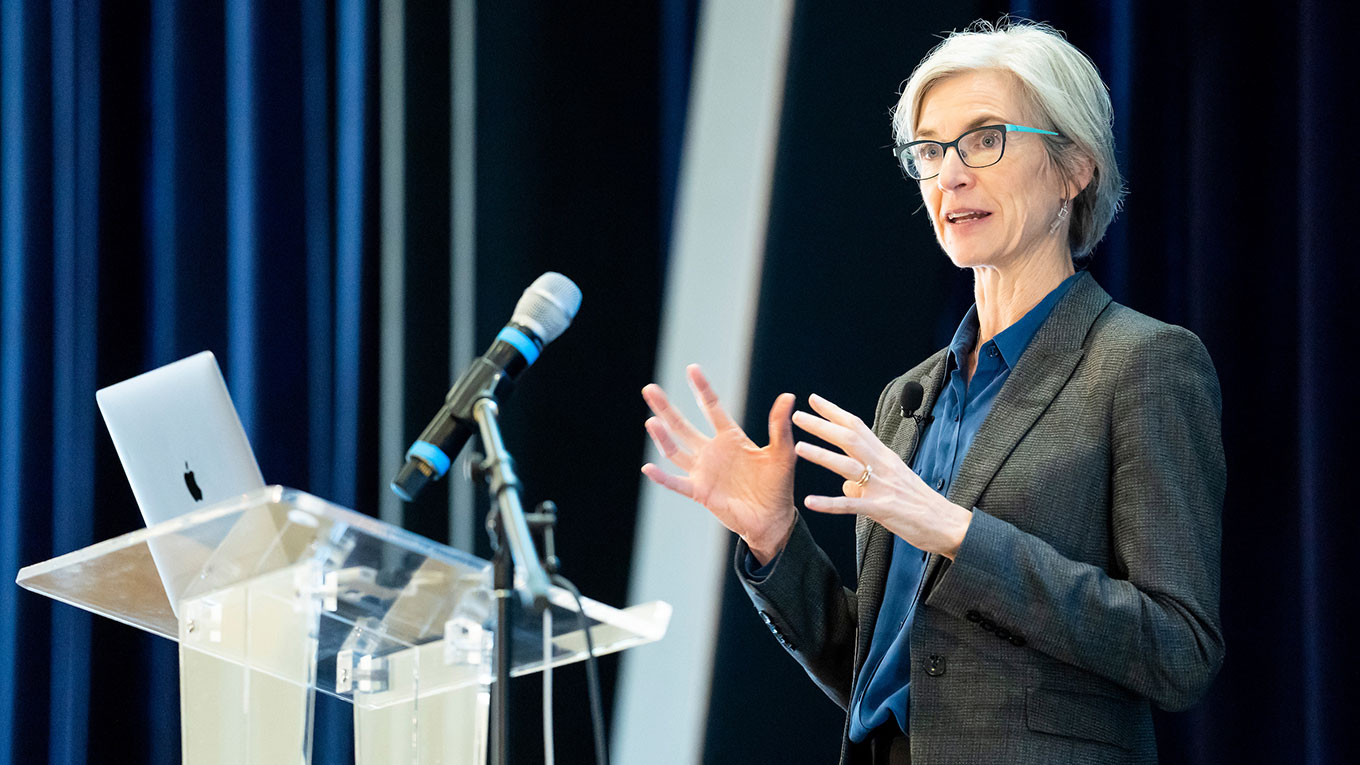 Nobel laureate Jennifer Doudna delivers the 2024 Ernest S. Kuh Distinguished Lecture. (Photo by Adam Lau/Berkeley Engineering)
Nobel laureate Jennifer Doudna delivers the 2024 Ernest S. Kuh Distinguished Lecture. (Photo by Adam Lau/Berkeley Engineering)Jennifer Doudna: Delivering the future of CRISPR-based genome editing
Jennifer Doudna, Nobel laureate and Li Ka Shing Chancellor’s Chair and Professor in the Departments of Chemistry and of Molecular and Cell Biology, presented this year’s Ernest S. Kuh Distinguished Lecture, “Delivering the Future of CRISPR-Based Genome Editing,” on February 2 at UC Berkeley. The sold-out event — produced by Berkeley Engineering in collaboration with the Society of Women Engineers — marks the 11th talk in the lecture series, which features scientists and engineers tackling the world’s most pressing problems.
Doudna is known for developing CRISPR-Cas9, a groundbreaking technology that some call “genetic scissors.” With it, scientists can snip and edit DNA — the genetic code of life — unlocking remarkable possibilities in biology, including treatments for thousands of intractable diseases. This work has changed the course of genomics research, allowing scientists to rewrite DNA with unprecedented precision, and won Doudna and collaborator Emmanuelle Charpentier the 2020 Nobel Prize in Chemistry.
During the lecture, Doudna spoke about the origins of CRISPR and how it works, as well as exciting breakthroughs made in medicine and agriculture using CRISPR-based genome editing. In addition, Doudna shared what she sees as the “next big advance” in this evolving field “that will make it possible for even more people to benefit from this technology.”
Doudna’s talk was timely, given the recent news that the FDA has approved Casgevy, the first CRISPR-based therapy — and promising cure — for sickle cell disease. This debilitating and life-threatening inherited blood disorder affects 100,000 people in the U.S. and 20 million people worldwide; the majority are of African descent. According to Doudna, the first patient to receive the therapy in clinical trials, Victoria Gray, has been symptom free for nearly five years. More than 30 patients have since been treated and all remain symptom free.
For Doudna, it’s gratifying to see how CRISPR, discovered only a dozen years ago, is making such a meaningful impact. “It was really amazing for me as a scientist to see someone’s life affected in that way by a technology that we’ve been involved in,” said Doudna, who is also the founder of the Innovative Genomics Institute.
But while such research milestones are worth celebrating, Doudna considers them just the start of her work. She is committed to making this and other cutting-edge treatments accessible and affordable.
“If we had ways to introduce these CRISPR-editing molecules into particular tissue types in the body, we could open the door to all kinds of applications of CRISPR medicine that would be safe, effective and a lot less expensive — and therefore a lot more widely available,” said Doudna.
She thinks that in vivo editing could be the answer. Getting to that point will take time, but Doudna is determined. “I wake up every day thinking: How are we going to do this?” she said. “And it’s a great mission for those of us working at public universities. It really aligns with our public mission of science for the greater good.”
When asked by Dean of Engineering Tsu-Jae King Liu about the potential role of artificial intelligence in her work, Doudna responded that she expects AI to have a “huge impact,” particularly in enabling greater efficiency. “I told my students that what we want machine learning to do is…make it possible for us to do many fewer experiments, but the right ones,” she said.
Doudna also addressed audience questions about off-target mutations and using CRISPR technology to enhance athletic performance — an unlikely scenario given the complexity of identifying and editing the countless genes involved in strength and endurance.
In addition, she spoke about the ethical responsibility that comes with having such a powerful technology as CRISPR. “One of the things that we’ve been working through here at Berkeley is to really figure out how you balance the benefits of the technology along with its intrinsic risks,” said Doudna.
Attendees also learned how CRISPR is making an impact beyond the realm of medicine, including applications in agriculture. According to Doudna, the technology offers a precise and safe way to alter plant genomes, so scientists can change just the gene or genes that affect a trait of interest and nothing else.
“I think that’s very compelling, it’s very exciting to think about the potential there,” said Doudna. “Again, it’s not a fantasy. This isn’t a thing that maybe in 25 years will be happening; it’s happening right now.”
As an example, she described how UC Davis researchers used CRISPR to develop rice that is highly productive yet requires 10 times less water than standard varieties. Such traits could be extremely beneficial to regions grappling with drought, and, consequently, food shortages, due to climate change.
“I think that in the future, we’re going to see opportunities to use CRISPR in these sorts of precise ways that will have really practical, valuable impact really across the field of agriculture,” she said.
According to Doudna, these advances were made possible, in part, thanks to the foundational research performed at UC Berkeley. Throughout the discussion, Doudna highlighted the valuable contributions made by fellow researchers and expressed gratitude toward them for making these advances possible.
“For students, in particular, I wanted to point out that in my career, the story of CRISPR — really the work that we’ve done over many years here at Berkeley — has really been a combination of opportunity, serendipity and collaboration,” said Doudna.